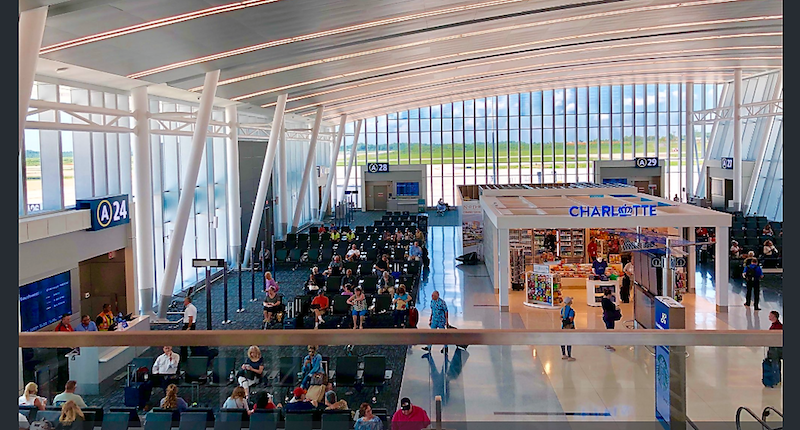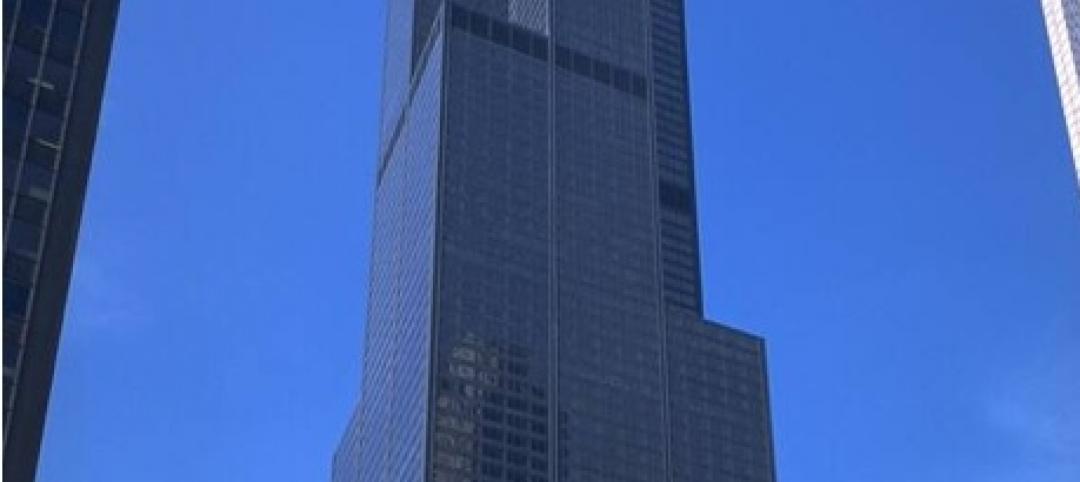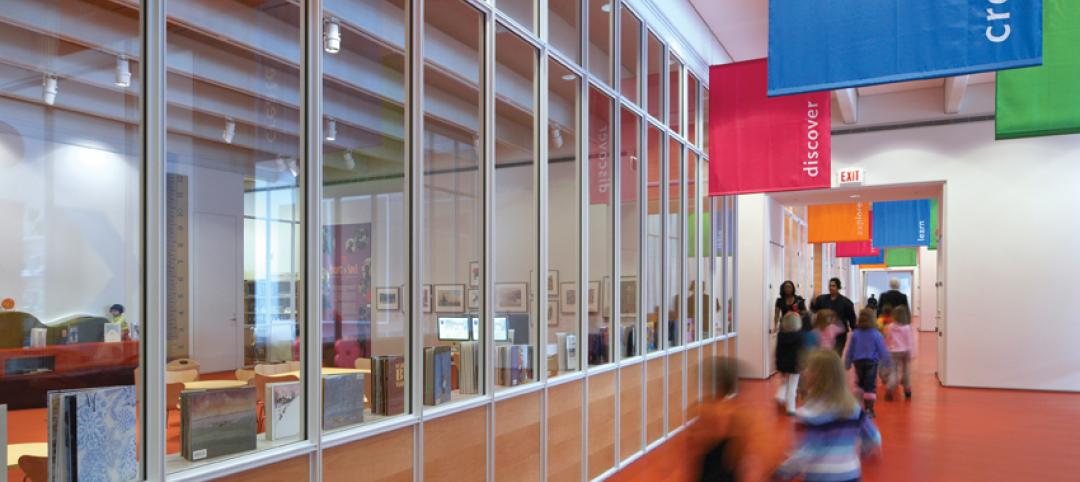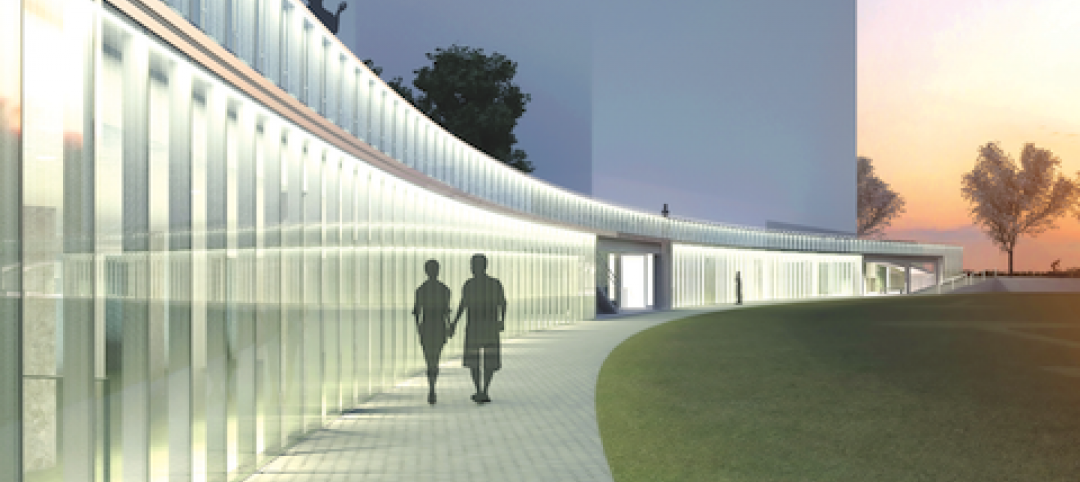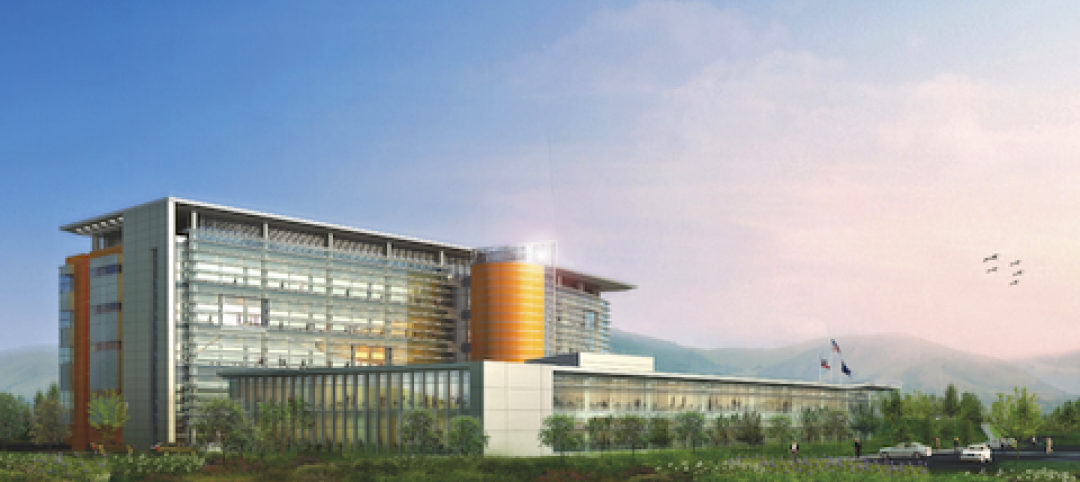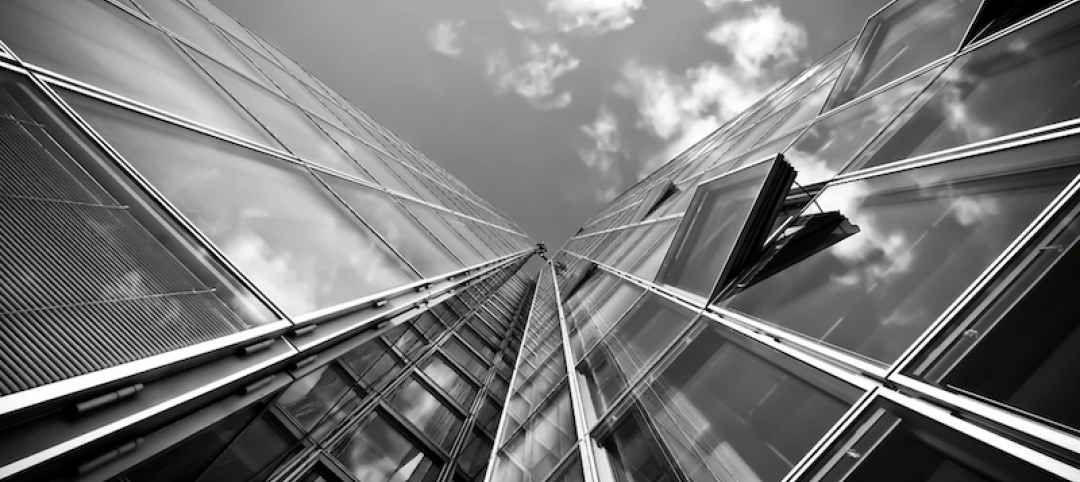Next month, nine remodeled gates inside Terminal 1 at San Francisco International Airport will reopen, with another nine scheduled to reopen in March 2020. The $2.4 billion remodel of this terminal should be completed in 2023.
This 1.2-million-sf net-zero-energy space, designed by Gensler, will include 57,000 sf of dynamic glazing supplied by View, a 12-year-old company based in Milpitas, Calif., that currently has its product in six of the top 15 airports in the U.S.
For example, the Terminal A expansion at Charlotte (N.C.) Douglas Airport included 20,000 sf of dynamic glass, with gate walls that are 40-ft-tall by 50-ft-wide glass walls. “We can do large-format glass that’s critically important to airports,” says Brandon Tinianov, View’s Vice President of Industry Strategy.
Unlike thermochromic glass that responds directly to changes in sunlight and temperature, View’s glass uses nano-layers of electrochromic coating on its surface. When voltage is applied, the glass tints. View’s intelligent system allows the windows to respond to the surrounding environment automatically, to eliminate heat and glare. Tinting of windows in rooms can be controlled by zones.
Tinianov concedes that the upfront cost for View’s glass is a barrier to entry for some clients. That’s why View emphasizes longer-term operating cost benefits, which can be substantial when HVAC systems can be downsized. View claims that its dynamic glass reduces a building’s energy consumption and costs by 18% annually, and can block more than 90% of solar radiation, thereby reducing peak cooling loads by 23%.
Tinianov also points to DFW International Airport in Texas, where View participated in a pilot study to gauge the relationship between passenger experience and revenue. A restaurant near two gates that was underperforming saw its revenue increase, on a year-to-year basis, by 102% after View installed dynamic glass on its eastern façade, says Tinianov.
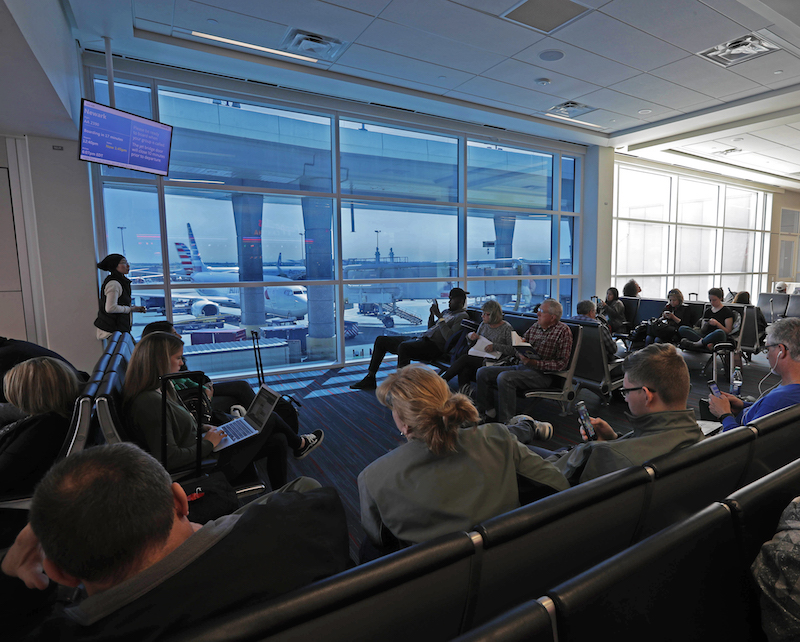
The waiting area at a gate at DFW International Airport in Texas, with and without tinted glass. Image: Courtesy of View
Since the company’s inception, View has installed its glass in 50 million sf of buildings. Airports represent about 20% of View’s project portfolio. Healthcare and multifamily account for 10% each. And offices represent 60%. “The big value is office towers with thousands of windows,” says Tinianov. This month, the city of San Francisco and the developer Related topped off 49 South Van Ness, a 430,000-sf office building designed by Skidmore, Owings & Merrill that features View’s smart glass.
“We believe that a core role of architecture is improving human performance and enriching the human experience while using as few resources–particularly energy–as possible. The dynamic glass in this building plays a huge part in achieving those goals.” says Mark Schwettmann, SOM’s Design Director.
During the design phase of San Francisco’s Terminal 1 remodel, the building team evaluated six different sustainability measures, and, according to Tinianov, the scenario that included dynamic glass performed the best.
View sees growth potential in promoting dynamic glass for sustainability, health/wellness, and security. Every View installation now includes a smart building platform that consists of power, network, and communication infrastructure. This will allow View to add apps that can help manage a building’s physical and digital security, air quality, and acoustic levels.
Last November View partnered with Microsoft to launch SmartProtect, a window-based security solution that automatically detects glass breakage. The app leverages Microsoft Azure IoT service, Azure Digital Twin.
Related Stories
| Mar 29, 2011
Chicago’s Willis Tower to become a vertical solar farm
Chicago’s iconic Willis Tower (formerly the Sears Tower) is set to become a massive solar electric plant with the installation of a pilot solar electric glass project.
| Feb 10, 2011
7 Things to Know About Impact Glazing and Fire-rated Glass
Back-to-basics answers to seven common questions about impact glazing and fire-rated glass.
| Feb 7, 2011
President Obama cites PPG glass, coatings in Penn State speech
President Barack Obama yesterday acknowledged PPG Industries as a leader in the development of high-performance glass and coatings for energy-efficient buildings during a visit to Penn State University that kicked off the U.S. government’s “Better Buildings Initiative.’
| Nov 16, 2010
NFRC approves technical procedures for attachment product ratings
The NFRC Board of Directors has approved technical procedures for the development of U-factor, solar heat gain coefficient (SHGC), and visible transmittance (VT) ratings for co-planar interior and exterior attachment products. The new procedures, approved by unanimous voice vote last week at NFRC’s Fall Membership Meeting in San Francisco, will add co-planar attachments such as blinds and shades to the group’s existing portfolio of windows, doors, skylights, curtain walls, and window film.
| Nov 11, 2010
Saint-Gobain to make $80 million investment in SAGE Electrochromics
Saint-Gobain, one of the world’s largest glass and construction material manufacturers, is making a strategic equity investment in SAGE Electrochromics to make electronically tintable “dynamic glass” an affordable, mass-market product, ushering in a new era of energy-saving buildings.
| Nov 11, 2010
Saint-Gobain to make $80 million investment in SAGE Electrochromics
Saint-Gobain, one of the world’s largest glass and construction material manufacturers, is making a strategic equity investment in SAGE Electrochromics to make electronically tintable “dynamic glass” an affordable, mass-market product, ushering in a new era of energy-saving buildings.
| Oct 13, 2010
Community center under way in NYC seeks LEED Platinum
A curving, 550-foot-long glass arcade dubbed the “Wall of Light” is the standout architectural and sustainable feature of the Battery Park City Community Center, a 60,000-sf complex located in a two-tower residential Lower Manhattan complex. Hanrahan Meyers Architects designed the glass arcade to act as a passive energy system, bringing natural light into all interior spaces.
| Oct 13, 2010
County building aims for the sun, shade
The 187,032-sf East County Hall of Justice in Dublin, Calif., will be oriented to take advantage of daylighting, with exterior sunshades preventing unwanted heat gain and glare. The building is targeting LEED Silver. Strong horizontal massing helps both buildings better match their low-rise and residential neighbors.
| Oct 6, 2010
Windows Keep Green Goals in View
The DOE's National Renewable Energy Laboratory has almost 600 window openings, and yet it's targeting LEED Platinum, net-zero energy use, and 50% improvement over ASHRAE 90.1. How the window ‘problem’ is part of the solution.


